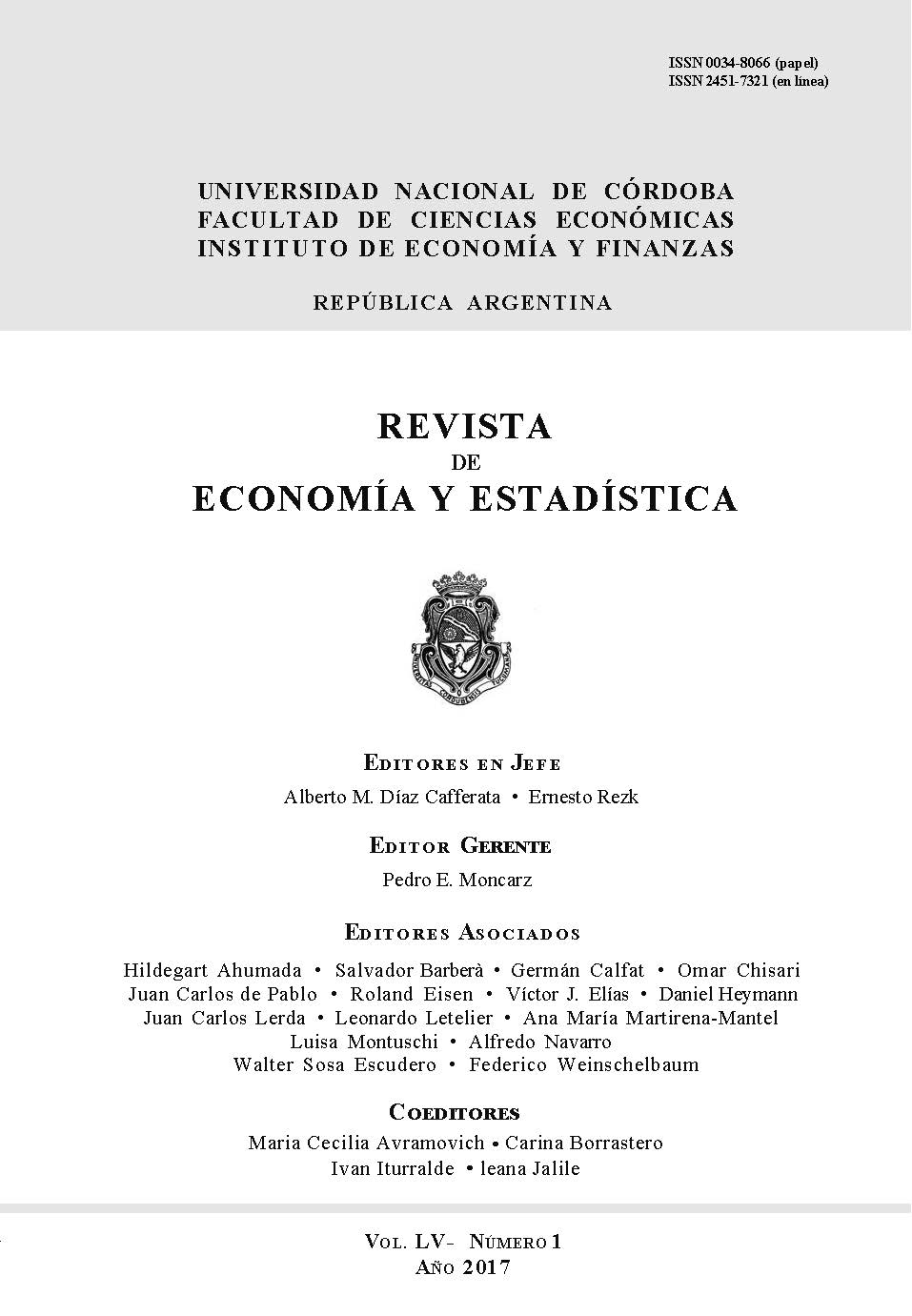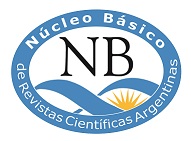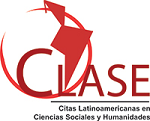Integración de Perspectivas Teóricas sobre Sustentabilidad en Cadenas Globales de Valor
DOI:
https://doi.org/10.55444/2451.7321.2017.v55.n1.28362Palabras clave:
gobernanza, upgrading, teoría institucional , teoría de stakeholders, estudios críticos en administraciónResumen
La sustentabilidad organizacional, vista como la relación equilibrada o tensionada de las dimensiones económicas, sociales y ambientales, es un concepto abordado en el enfoque de cadenas globales de valor [CGV] a través de diversas perspectivas. El objetivo del presente es la integración en un mismo marco conceptual de algunas de esas perspectivas, organizadas en gerenciales, institucionales y críticas. A través del análisis de bibliografía seleccionada, se construyó un marco conceptual que complementa y modera los postulados tradicionales del enfoque de CGV para la determinación del upgrading de sustentabilidad, considerando finalmente que el análisis integral mejora el de cada perspectiva por separado.
Descargas
Referencias
Achabou, M., Dekhili, S. y Hamdoun, M. (2015). “Environmental Upgrading of Developing Country Firms in Global Value Chains”, Business Strategy and the Environment. Vol. 26, No. 2, pp. 224-238.
Adler, P. , Forbes, L. C. and Willmott, H. (2007). “Critical management studies”. The Academy of Management Annals, Vol. 1 No. 1, pp. 119-179.
Aguinis, H. y Glavas, A. (2012). “What we know and don't know about corporate social responsibility: a review and research agenda”. Journal of Management, Vol. 38 No. 4, pp. 932-968.
Alvesson, M. y Willmott, H. (Eds.) (1992). Critical management studies, Sage, London.
Amato, C., Buraschi, M. y Peretti, M. F. (2016). "Orientación de los empresarios de Córdoba-Argentina hacia la sustentabilidad y la responsabilidad social empresarial: identificación de variables asociadas a cada constructo". Contaduría y Administración, Vol. 61 No. 1, pp- 84-105.
Banerjee, S. B. (2003). “Who sustains whose development? Sustainable development and the reinvention of nature”. Organization Studies, Vol. 24 No. 1, pp. 143-180.
Bansal, P. (2005). “Evolving sustainably: A longitudinal study of corporate sustainable development”. Strategic Management Journal. Vol. 26 No. 3, pp. 197–218.
Bansal, P. y Hoffman, A. J. (Eds.) (2011). The Oxford handbook of business and the natural environment, Oxford University Press, New York.
Bansal, P. y Song, H. (2017). “Similar but not the same: differentiating Corporate Responsibility from sustainability”, Academy of Management Annals, Vol. 11 No.1, pp. 105-149.
Barrientos, S., Gereffi, G. y Rossi, A. (2010). “Economic and social upgrading in global production networks: developing a framework for analysis”. International Labor Review, Vol. 150 No. 3-4, pp. 319-340.
Bernhardt, T. y Milberg, W. (2011). "Economic and Social Upgrading in global value chains: analysis for horticulture, apparel, tourism and mobile telephones, Capturing the Gains", Department for International Development, UK.
Boström, M., Jönsson, A., Lockie, S., Mol, A. y Oosterveer, P. (2015). “Sustainable and responsible supply chain governance: challenges and opportunities”, Journal of Cleaner Production, Vol. 107, pp. 1-7.
Bowen, F. (2017). “Marking their own homework: The pragmatic and moral legitimacy of Industry Self-Regulation”. Journal of Business Ethics, Vol. 156 No. 1, pp. 257–272.
Bryson, J. (2004). “What to do when Stakeholders matter”. Public Management Review, Vol. 6 No. 1, pp. 21-53.
Bush, S., Oosterveer, P., Bailey, M. y Mol, A. (2015). “Sustainability governance of chains and networks: a review and future outlook”. Journal of Cleaner Production, Vol. 107, pp. 8-19.
Callahan, J. L. (2010). “Constructing a manuscript: Distinguishing integrative literature reviews and conceptual and theory articles”. Human Resource Development Review, Vol. 9 No. 3, pp. 300-304.
Carroll, A. (1999). “Corporate Social Responsibility: Evolution of a Definitional Construct”. Business Society, Vol. 38 No. 3, pp. 268-295.
Cashore, B. (2002). “Legitimacy and the privatization of environmental governance: How non-state market-driven (NSMD) governance systems gain rule-making authority”. Governance: An International Journal of Policy, Administration and Institutions, Vol. 15 No. 4, pp. 503–529.
Cox, A. (2001). “Managing with power: strategies for improving value appropriation from supply relationships”. The Journal of Supply Chain Management, Vol. 37 No. 2, pp. 42–47.
Crouch, C. (2006). “Modelling the Firm in its Market and Organizational Environment: Methodologies for Studying Corporate Social Responsibility”. Organization Studies, Vol. 27 No. 10, pp. 1533-1551.
Dahlsrud, A. (2008). “How corporate social responsibility is defined: an analysis of 37 definitions”. Corporate Social Responsibility and Environmental Management, Vol. 15 No. 1, pp. 1-13.
Dallas, M., Ponte, S. y Sturgeon, T. (2017). “A typology of power in Global Value Chains”, Working Paper in Business and Politics [92], Copenhagen Business School, Frederiksberg, July 10.
Dalle, D., Fossati, V. y Lavopa, F. (2013). “Política industrial: ¿el eslabón perdido en el debate de las Cadenas Globales de Valor?’. Revista Argentina de Economía Internacional, Vol. 2, pp. 3-16.
De Marchi, V., Di Maria, E. y Micelli, S., (2012). “Environmental strategies, upgrading and competitive advantage in global value chains”. Business Strategy and the Environment, Vol. 22, pp. 62-72.
Di Maggio, P. y Powell, W. (1983). “The iron cage revisited: institutional isomorphism and collective rationality in organisational fields”. American Sociological Review, Vol. 48, pp. 147-160.
Donaldson, T. y Preston, L. E. (1995). “The stakeholder theory of the corporation: Concepts, evidence, and implications”. Academy of Management Review, Vol. 20 No. 1, pp. 65–91.
Elkington, J. (1994). “Towards the sustainable corporation: Win-win-win business strategies for sustainable development”. California Management Review, 36(2). 90-100.
Elkington, J. (1997). Cannibals with forks: The triple bottom line of 21st century business, Capestone, Oxford, UK.
Elkington, J. (2004). “Enter the triple bottom line”, in Henriques, A. and Richardson, J. (Eds). The triple bottom line: Does it all add up?, EarthScan, London, pp. 1-16.
Freeman, R. E. (1984). Strategic Management: A Stakeholder Approach, Pitman, Boston.
Freeman, R. E. (2010). “Managing for stakeholders: Trade-offs or value creation”, Journal of Business Ethics, Vol. 96, pp. 7–4.
Gallopín, G. C. (2003). Sostenibilidad y desarrollo sostenible: un enfoque sistémico. Chile: CEPAL.
Garriga, E. (2014). “Beyond stakeholder utility function: stakeholder capability in the value creation process”. Journal of Business Ethics, Vol. 120, pp. 489-507.
Gereffi, G. (2014). “Global value chains in a post-Washington Consensus world”. Review of International Political Economy, Vol. 21 No. 1, pp. 9-37.
Gereffi, G. y Fernández-Stark, K. (2011). Global value chain analysis: a primer, Duke University, North Carolina.
Gereffi, G., Humphrey, J. y Sturgeon, T. (2005). “The governance of global value chains”. Review of International Political Economy, Vol. 12 No. 1, pp. 78-104.
Gereffi, G. y Lee, J. (2016). “Economic and social upgrading in global value chains and industrial clusters: Why governance matters”. Journal of Business Ethics, Vol. 133, pp. 25–38.
Gladwin, T., Kennelly, J. y Krause, T. (1995). “Shifting Paradigms for Sustainable Development: Implications for Management Theory and Research”, Academy of Management Review, Vol. 20 No. 4, pp. 874-907.
Grob, S. y Benn, S. (2014). “Conceptualising the adoption of sustainable procurement: an institutional theory perspective”. Australasian Journal of Environmental Management, Vol. 21 No.1, pp. 11-21.
Harrison, J. S., Bosse, D. A., y Phillips, R. A. (2010). “Managing for stakeholders, stakeholder utility functions, and competitive advantage”. Strategic Management Journal, Vol. 31 No. 1, pp. 58–74.
Hernández, V. y Pederson, T. (2017). “Global value chain configuration: A review and research agenda”. Business Research Quarterly, Vol. 20, pp. 137-150.
Hoejmose, S., Grosvold, J. y Millington, A. (2014). “The effect of institutional pressure on cooperative and coercive 'green' supply chain practices”. Journal of Purchasing & Supply Management, Vol. 20, pp. 215-224.
Humphrey, J. y Schmitz, H. (2002). “How does insertion in global value chains affect upgrading in industrial clusters?”. Regional Studies, Vol. 36 No. 9, pp. 1017-1027.
Jepperson, R. L. (1991). “Institutions, institutional effects, and institutionalism”, in Powell, W. and Di Maggio, P. (Eds). The new institutionalism in organizational analysis. University of Chicago Press, Chicago, pp. 143-163.
Jeppesen, S. y Hansen, M. (2004). “Environmental upgrading of Third World enterprises through linkages to transnational corporations. Theoretical perspectives and preliminary evidence”. Business Strategy and the Environment, Vol. 13, pp. 261-274.
Jonsen, K., Aycan, Z., Berdrow, I., Boyacigiller, N. A., Yoko Branner, M., Davison, S. C., …y Weber, T. J. (2010). "Scientific mindfulness: a foundation for the future themes in international business”, in Devinney, T., Pedersen, T. and Tihanyi, L. (Eds). The Past, Present and Future of International Business and Management. Advances in International Management, Emerald Group Publishing, Cheltenham, Vol. 23, pp. 43-69.
Kaplinsky, R. y Morris, M. (2001). A handbook for value chain research. International Development Research Centre.
Kogg, B. y Mont, O. (2012). “Environmental and social responsibility in supply chains: The practise of choice and inter-organisational management”. Ecological Economics, Vol. 83, pp. 154-163.
Maignan, I. y Ferrell, O. C. (2004). “Corporate Social Responsibility and Marketing: an integrative framework”. Journal of the Academy of Marketing Science, Vol. 32 No. 1, pp. 3-19.
Meixell, M. J. y Luoma, P. (2015). “Stakeholder pressure in sustainable supply chain management: A systematic review". International Journal of Physical Distribution & Logistics Management, Vol. 45 No. 1/2, pp. 69-89.
Milne, M. J., y Gray, R. (2013). “W(h)ither ecology? The triple bottom line, the global reporting initiative, and corporate sustainability reporting”. Journal of Business Ethics, Vol. 118 No. 1, pp. 13–29.
Mitchell, R.; Agle, B. y Wood, D. (1997). “Toward a theory of stakeholder identification and salience: defining the principle of who and what really counts”. The Academy of Management Review, Vol. 22 No. 4, pp. 853-886.
Organización de Naciones Unidas (1987). El desarrollo sostenible, una guía sobre nuestro futuro común, Oxford University Press, New York.
Ponte, S. (2014). “‘Roundtabling’ sustainability: Lessons from the biofuel industry”. Geoforum, Vol. 54, pp. 261-271.
Ponte, S. and Ewert, J. (2009). “Which way is "up" in upgrading? Trajectories of change in the value chain for South African Wine”. World Development, Vol. 37 No. 10, pp. 1637-1650.
Porter, M. (1985). Competitive Advantage, Free Press, New York.
Poulsen, R., Ponte, S. and Lister, J. (2016). “Buyer-driven greening? Cargo-owners and environmental upgrading in maritime shipping”. Geoforum, Vol. 68, pp. 57-68.
Programa de Naciones Unidas para el Desarrollo (2016). Informe de los Objetivos de Desarrollo Sostenible. Naciones Unidas, Nueva York.
Roberts, J. y Dörrenbächer, C. (2012). “The futures of critical perspectives on international business”. Critical Perspectives on International Business, Vol. 8 No. 1, pp. 4–13.
Rowley, T. (1997). “Moving beyond dyadic ties: a network theory of stakeholder influences”. The Academy of Management Review, Vol. 22 No. 4, pp. 887-910.
Salas-Zapata, W.; Ríos-Osorio, L. y Álvarez-Del Castillo, J. (2011). “La ciencia emergente de la Sustentabilidad: de la práctica científica hacia la constitución de una ciencia”. Interciencia, Vol. 36 No. 9, pp. 699-706.
Santarcángelo, J., Schteingart, D. y Porta, F. (2017). “Cadenas Globales de Valor: una mirada crítica a una nueva forma de pensar el desarrollo”. Cuadernos de Economía Crítica, Vol. 4 No. 7, pp. 99-129.
Schnayder, L., Van Rijnsoever, F. J. y Hekkert, M. P. (2016). “Motivations for Corporate Social Responsibility in the packaged food industry: an institutional and stakeholder management perspective”. Journal of Cleaner Production, Vol. 122, pp. 212–227.
Schnittfeld, N. L., y Busch, T. (2016). “Sustainability management within supply chains–a resource dependence view”. Business Strategy and the Environment, Vol. 25 No. 5, pp. 337-354.
Schteingart, D., Santarcángelo, J. y Porta, F. (2017). “La Inserción Argentina en las Cadenas Globales de Valor”. Asian Journal of Latin American Studies, Vol. 30 No. 3, pp. 45-82.
Scott, W. R. (1987). “The adolescence of institutional theory”. Administrative Science Quarterly, Vol. 32, pp. 493-511.
Scott, W. R. (1995). Institutions and Organizations. Foundations for Organizational Science, SAGE, Thousand Oaks, CA.
Sen, A. (1999). Development as Freedom, Oxford University Press, Oxford.
Seuring, S. y Müller, M. (2008). “From a literature review to a conceptual framework for sustainable supply chain management”. Journal of Cleaner Production, Vol. 16 No. 15, pp. 1699-1710.
Shrivastava, P. (1995). “The role of firms in achieving ecological sustainability”. Academy of Management Review, Vol. 20 No. 4, pp. 936–960.
Slawinski, N. y Bansal, P. (2015). “Short on time: Intertemporal tensions in business sustainability”. Organization Science, Vol. 26 No. 2, pp. 531–549.
Sturgeon, T. J. (2011). “De cadenas de mercancías (commodities) a cadenas de valor: construcciones teóricas en una época de globalización”. Eutopía - Revista de Desarrollo Económico Territorial, No. 2, pp. 11-38
Touboulic, A., Chicksand, D., Walker, H. y Alvarez, A. (2014). “Managing imbalanced supply chain relationships for sustainability: A power perspective”. Decision Sciences, Vol. 45 No. 4, pp. 577–619.
Touboulic, A. y Walker, H. (2015). “Love me, love me not: A nuanced view on collaboration in sustainable supply chains”. Journal of Purchasing and Supply Management, Vol. 21 No. 3, pp. 178–191.
Young, R. y Esqueda, P. (2005). “Vulnerabilidades de la cadena de suministros: consideraciones para el caso de América Latina”. Academia. Revista Latinoamericana de Administración, Vol. 34, pp. 63-78.
Descargas
Publicado
Número
Sección
Licencia
Derechos de autor 2017 Mónica Buraschi, Celina N. Amato, María Florencia Peretti

Esta obra está bajo una licencia internacional Creative Commons Atribución-NoComercial-SinDerivadas 4.0.
Aquellos autores/as que tengan publicaciones con esta revista, aceptan los términos siguientes:
Los autores/as conservarán sus derechos de autor y garantizarán a la revista el derecho de primera publicación de su obra, el cuál estará simultáneamente sujeto a la Licencia Creative Commons Atribución-NoComercial-SinDerivar 4.0 Internacional que permite a terceros compartir la obra siempre que se indique su autor y su primera publicación esta revista.
Los autores/as podrán adoptar otros acuerdos de licencia no exclusiva de distribución de la versión de la obra publicada (p. ej.: depositarla en un archivo telemático institucional o publicarla en un volumen monográfico) siempre que se indique la publicación inicial en esta revista.
Se permite y recomienda a los autores/as difundir su obra a través de Internet (p. ej.: en archivos telemáticos institucionales o en su página web) antes y durante el proceso de envío, lo cual puede producir intercambios interesantes y aumentar las citas de la obra publicada. (Véase El efecto del acceso abierto)














